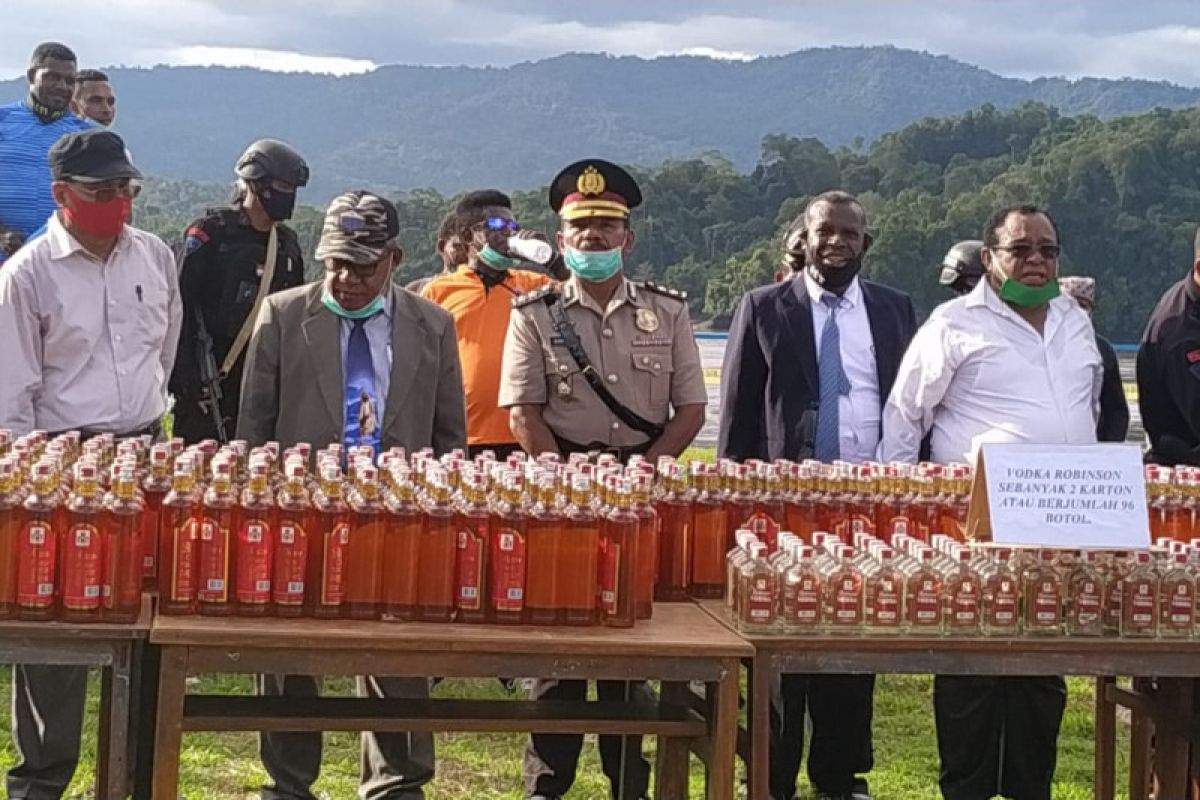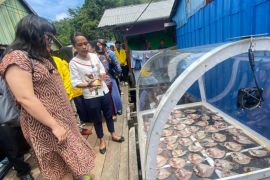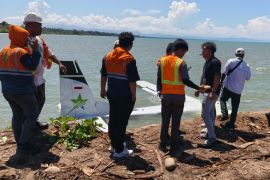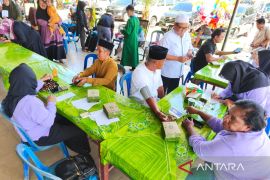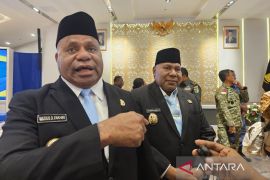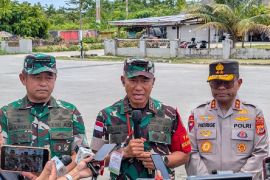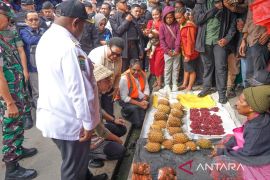In responding to this challenging reality, the local police continue to crack down on liquor producers, distributors, and sellers there.
This week, for instance, a joint team of personnel from the local police, military, and Nabire District's public order agency conducted raids in Siriwini and Sanoba neighborhoods.
The raids, led by Nabire Police Chief First Inspector Agus Suprayitno, resulted in the confiscation of one thousand liters of alcohol of the brand "Bobo".
The law enforcers confiscated 300 liters of liquor from a house in the Siriwini neighborhood, while 700 liters of liquor was seized during a raid conducted in the Sanoba neighborhood.
According to Papua Police Spokesperson Sen.Coms. Ahmad Musthofa Kamal, the raids were conducted as part of the efforts to reduce the crime rate in Nabire District.
Last month, police officers in Mimika District nabbed Dani, alias DM, 37, for allegedly making and selling an alcoholic beverage called "sopi".
Another suspect, identified as Y, 40, had managed to evade arrest, according to Mimika Police Chief Adjunct Sen. Coms. IGG Era Adhinata.
Local policemen raided DM's house after receiving a tip-off from local residents that DM and Y were regularly producing distilled liquor.
The raid operation resulted in the seizure of 15 liters of "sopi" that the suspects had stored in a 20-liter jerry can, he revealed.
The Papuan government has effectively banned the production, distribution, and sale of alcoholic beverages since 2016, in accordance with the Regional Government's Regulation Number 15 of 2013.
The regulation is aimed at protecting Papuans from such harmful effects of alcohol consumption as loss of consciousness and engaging in acts of domestic violence and crime.
The alcohol consumption has also contributed to the occurrences of deadly traffic accidents in the province. In 2019, the Papua police reported that the death toll from traffic accidents in Papua was recorded at 72.
The 2019 fatality rate was higher than that of 2018 which stood at 58, and the Papua police claimed that the alcohol consumption has become one of the causing factors besides bad driving habits of certain motorists and drivers (RRI, 2019).
Over these past two months, the Papua police had cracked down on those flouting the Regional Government's Regulation Number 15 of 2013 in Mimika and Nabire Districts.
The law enforcements were conducted amid the ongoing novel coronavirus pandemic that actually demands the people at large's participation to enable the Papua provincial government to win its fight against the deadly virus.
However, those making money from producing, distributing, and selling liquor beverages keep going ahead with their illegal business activities to serve local residents.
In fact, consuming alcohol cannot protect the drinkers from the COVID-19 infection. Instead, the World Health Organization has warned that those with an alcohol use disorder are "at greater risk of COVID-19".
As revealed in its public awareness campaign in https://www.euro.who.int/__data/assets/pdf_file/0010/437608/Alcohol-and-COVID-19-what-you-need-to-know.pdf, the WHO further warned that the liquor may more likely make the drinkers feel homeless and incarcerated than other members of their communities.
Therefore, the WHO suggests that those suffering the alcohol addiction take this COVID-19 pandemic situation as a momentum to quit drinking for the sake of their health.
If they fail to stop drinking, the WHO suggest that they at least "cut down considerably, as various social cues and peer pressure situations, such as parties, friends' gatherings, restaurants and clubs, are (by necessity) avoidable." (WHO, 2020).
Indeed, drinking alcohol does harm the drinkers' health condition in both short and long terms.
The long term health problems that those consuming the liquor beverages may face are, among others, "swelling and pain, alcoholic liver disease, cancer, yellowing of skin and spider veins, and potential weight gain" (Te Hiringa Hauora, 2020).
Not only that. In the context of Papuan communities, the consumption of alcoholic beverages may have contributed to the shortened life expectancy of native Papuans.
Considering the harmful impacts of liquor, the native Papuan people are expected to be collectively aware of the dire need to support the liquor ban by supervising the sales of alcoholic beverages at minimarkets and kiosks.
The local government and law enforcement agencies are suggested to keep enforcing legal sanctions against those flouting the provincial regulation on the liquor ban.
At the same time, intensifying a public awareness campaign on the harmful effects of drinking liquor is also indispensable to protect more members of local communities from getting dragged into the vicious circle of alcohol addiction and abuse.
This preventive effort needs to be promoted and supported by not only the government authorities but also teachers at schools, parents, and other elements of Papuan communities, including religious, youth, and community leaders.
Saving the Papuan people from the vicious circle of alcohol addiction and abuse will contribute to the improvement of their quality of life, and the province's human development index.
Related news: Papua police seize 1,000 liters of liquor in Nabire district
Related news: A tale of Indonesian soldiers' care for boosting Papuans' literacy
Editor: Fardah Assegaf
Copyright © ANTARA 2020
